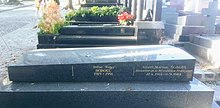Albert Soboul
Albert Marius Soboul (born April 27, 1914 in Ammi-Moussa ( Oran ), Algeria, † September 11, 1982 in Nîmes ) was a French historian and communist . He is known for his works on the French Revolution and Napoléon Bonaparte .
Life
The father died in the year Albert Soboul was born. After the death of his mother in 1922, Albert lived with his older sister Gisele with an aunt in Algiers . The family later moved to Nîmes, where he first attended the local high school and then later transferred to the high school Louis-le-Grand in Paris . After graduating from school, he studied at the Sorbonne .
As a communist student, he published a book about the revolutionary Louis Antoine de Saint-Just in 1936 under the pseudonym Pierre Derocles . In 1939 he officially joined the Communist Party . He did his military service from 1939 to 1940 in the artillery, but without getting involved in combat. He then began teaching at the Montpellier high school, but was dismissed in July 1942 for political activities. He spent the following years doing research at the Musée des Arts et Traditions Populaires .
After the German occupation, he resumed teaching and taught first in Montpellier , later in the Marcelin Berthelot and Henri IV high schools . Soboul later became friends with the well-known historian Georges Lefebvre and received his doctorate with his 1100-page dissertation Les sans-culottes parisiens en l'an II . He was then appointed to the University of Clermont-Ferrand and in 1967 followed Marcel Reinhard to the chair for the history of the French Revolution at the Sorbonne.
After the death of Georges Lefebvre, Albert Soboul was one of the main proponents of the history of the French Revolution and the main opponent of the so-called revisionist historians such as François Furet and Denis Richet .
Soboul is buried in the Père Lachaise cemetery not far from the Federated Wall , where the last fighters of the Paris Commune were shot in May 1871 .
Views on the French Revolution
Soboul's main work is “The History of the Great French Revolution”, which to this day is one of the standard works on the revolution, not least thanks to the understandable presentation.
In describing the revolution as a Marxist, Soboul attaches great importance to the class struggles of this epoch and repeatedly analyzes the interests of the various social classes and examines how these influenced the course of the revolution.
The focus of the book is the reign of terror . For him this is a compromise between the petty-bourgeois Jacobins and the Parisian lower classes, the sans-culottes . For him, this epoch is the climax of the revolution, because it was here that the social question first determined politics. He therefore rates the terror as positive overall:
“He gave the government committees the power of coercion that enabled them to restore the authority of the state and to impose the order of the state's welfare on all. He contributed to the development of the feeling of national solidarity and temporarily silenced the class egoisms. In particular, the terror enabled the coercive economy to be carried out necessary for the war effort and salvation of the nation. In this sense, the reign of terror contributed to the victory. "
Individual evidence
- ↑ Albert Soboul: The Great French Revolution. An outline of their history (1789–1799) , Wissenschaftliche Buchgesellschaft, Darmstadt 1983, p. 353
Fonts (selection)
- L'Armée nationale sous la Révolution . Éditions France d'abord, 1945.
- Les Sans-culottes parisiens en l'an II. Mouvement populaire et gouvernement révolutionnaire (1793–1794) . La Roche-sur-Yon 1958.
- La Révolution française. 1789-1799 . Editions sociales, 1948.
- Histoire de la Révolution française . (2 volumes, 1. De la Bastille à la Gironde; 2. De la Montagne à Brumaire), Éditions sociales, 1962.
- La Civilization de la Révolution française . (Only the first volume has been published: La crise de l'Ancien Régime), Arthaud, 1970.
With Walter Markov
- 1789 - The Great Revolution of the French . Akademie-Verlag, Berlin, 1973.
- French Revolution and Popular Movement: the sans-culottes . Rütten & Loening, Berlin 1962, Suhrkamp 1978, ISBN 978-3518109601
Web links
- Literature by and about Albert Soboul in the catalog of the German National Library
- Entry at the Berlin-Brandenburg Academy of Sciences
| personal data | |
|---|---|
| SURNAME | Soboul, Albert |
| ALTERNATIVE NAMES | Soboul, Albert Marius (full name) |
| BRIEF DESCRIPTION | French historian and communist |
| DATE OF BIRTH | April 27, 1914 |
| PLACE OF BIRTH | Ammi-Moussa (Oran), Algeria |
| DATE OF DEATH | September 11, 1982 |
| Place of death | Nîmes |
